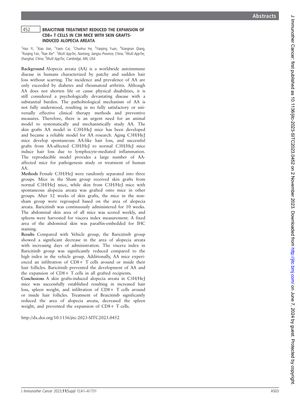Braicitinib Treatment Reduced the Expansion of CD8+ T Cells in C3H Mice With Skin Grafts-Induced Alopecia Areata
October 2023
in “
Regular and Young Investigator Award Abstracts
”

TLDR Baricitinib treatment helped reduce hair loss symptoms in mice by decreasing inflammation-related immune cells.
In a study using C3H/HeJ mice as a model for alopecia areata (AA), a condition characterized by patchy hair loss, Baricitinib treatment was found to significantly reduce the area of hair loss and spleen weight, as well as prevent the expansion of CD8+ T cells, which are associated with the inflammation leading to hair loss. The mice were divided into three groups, with the non-sham groups receiving skin grafts from mice with spontaneous AA. After 12 weeks, Baricitinib was administered for 10 weeks, resulting in a notable decrease in AA symptoms compared to the vehicle group. This suggests that Baricitinib could be a potential treatment for AA by mitigating immune cell infiltration and inflammation.


